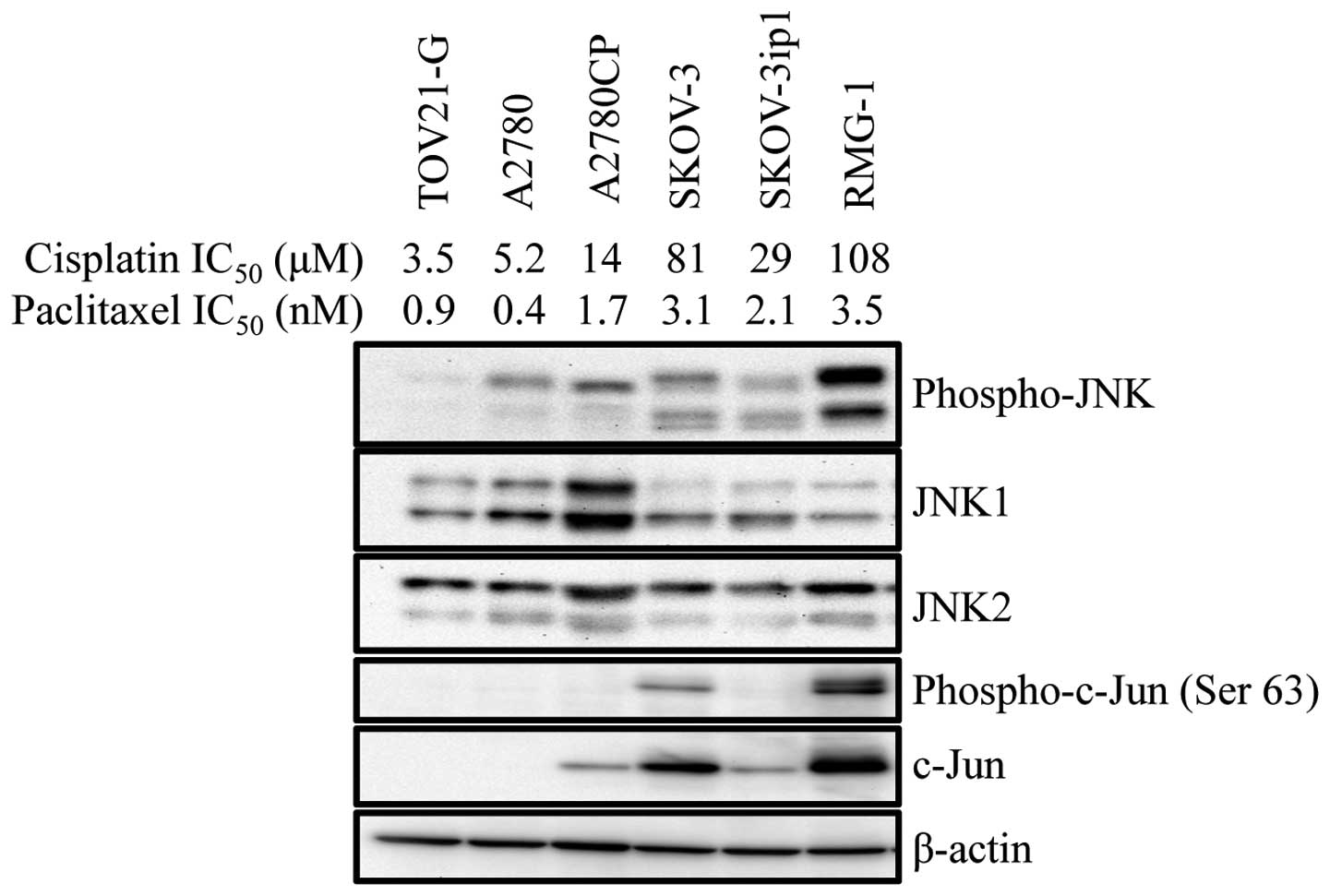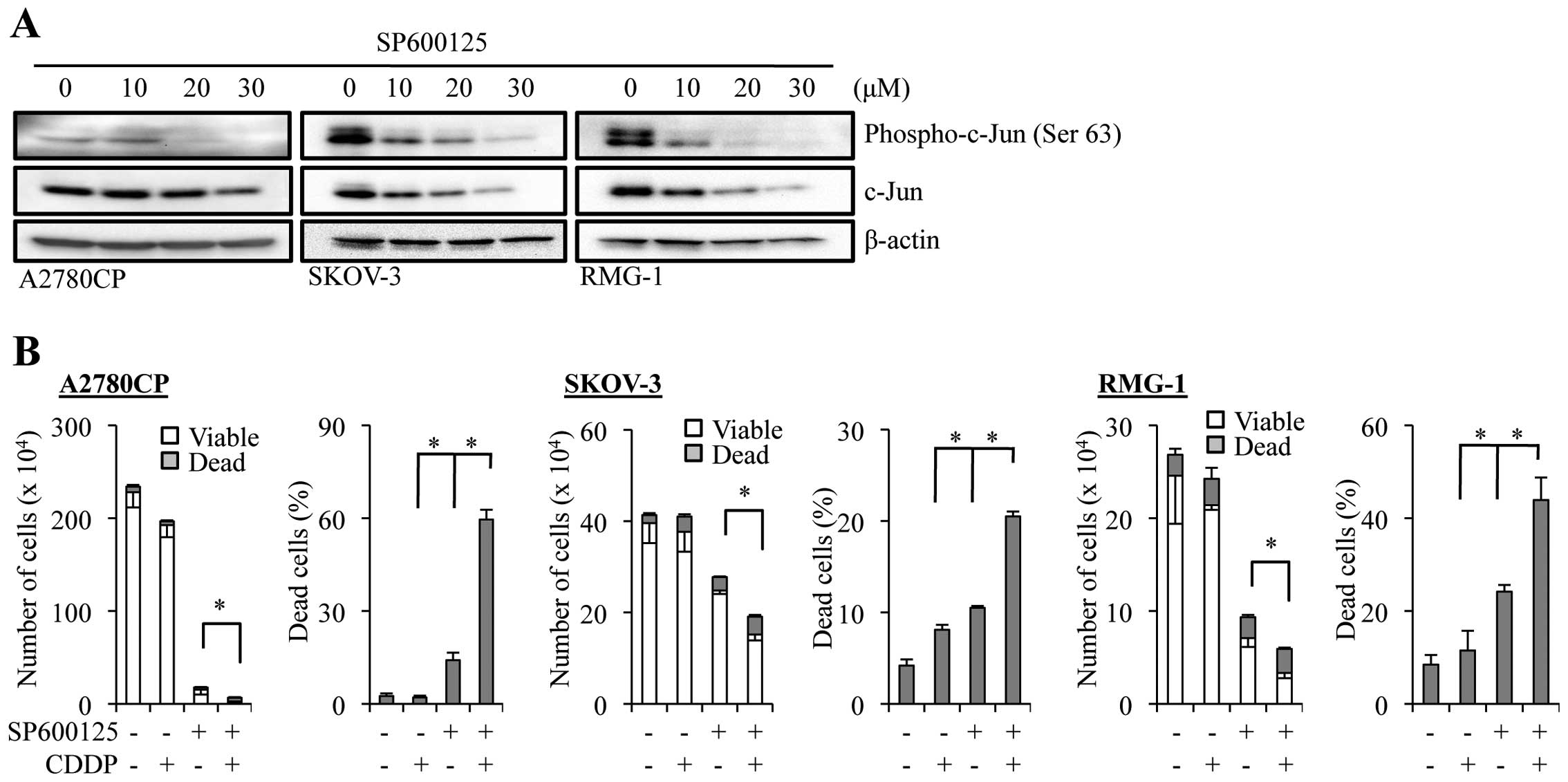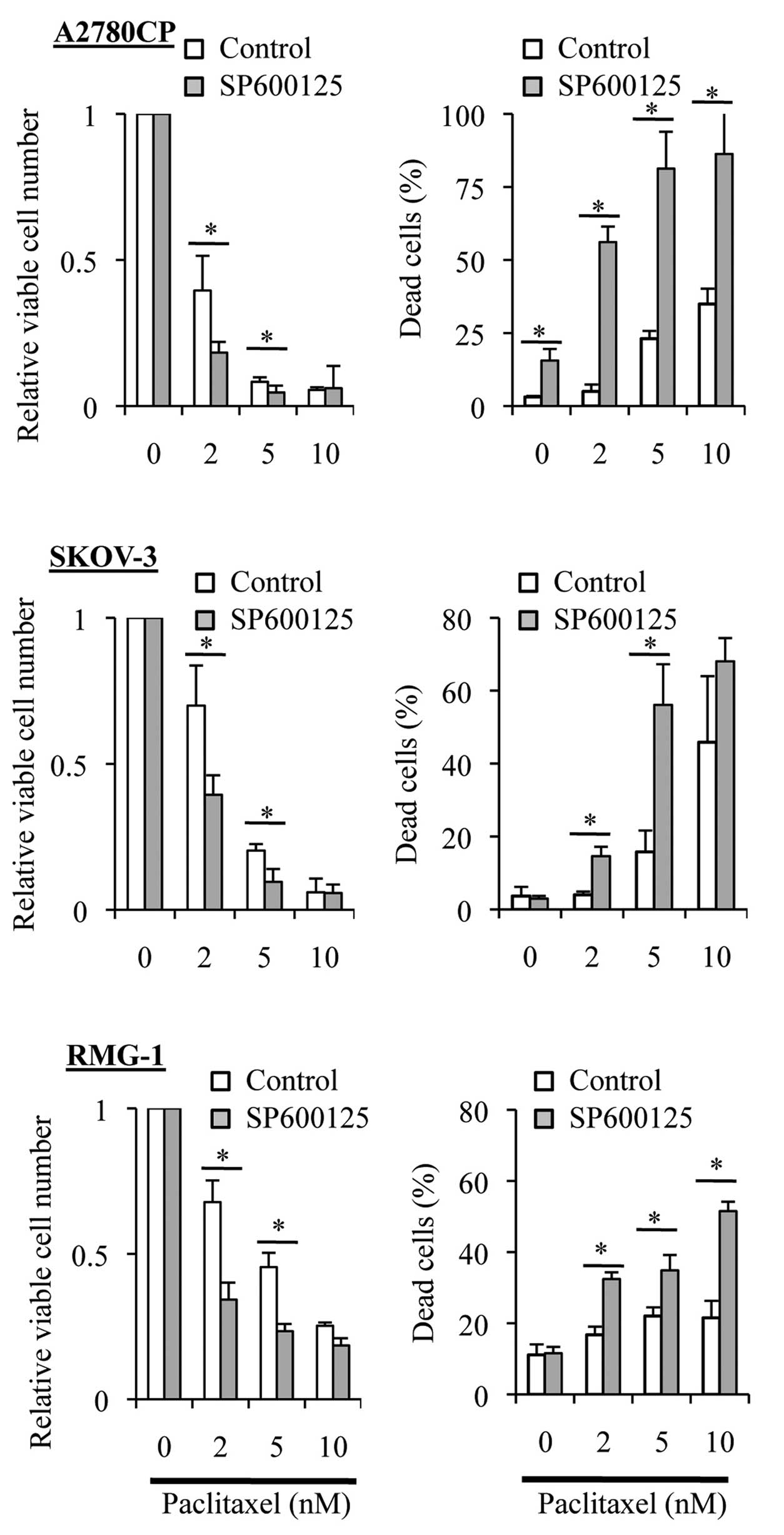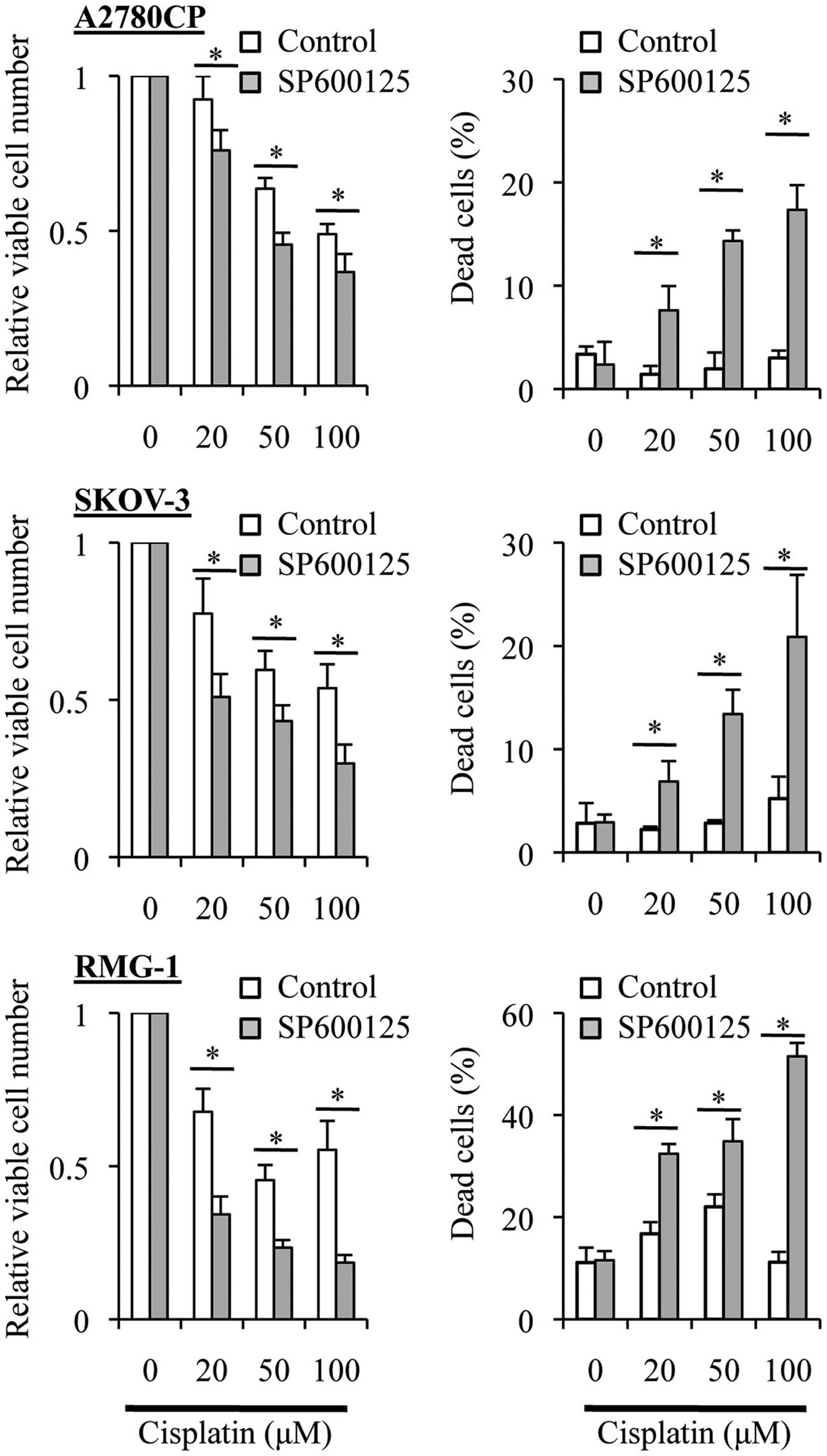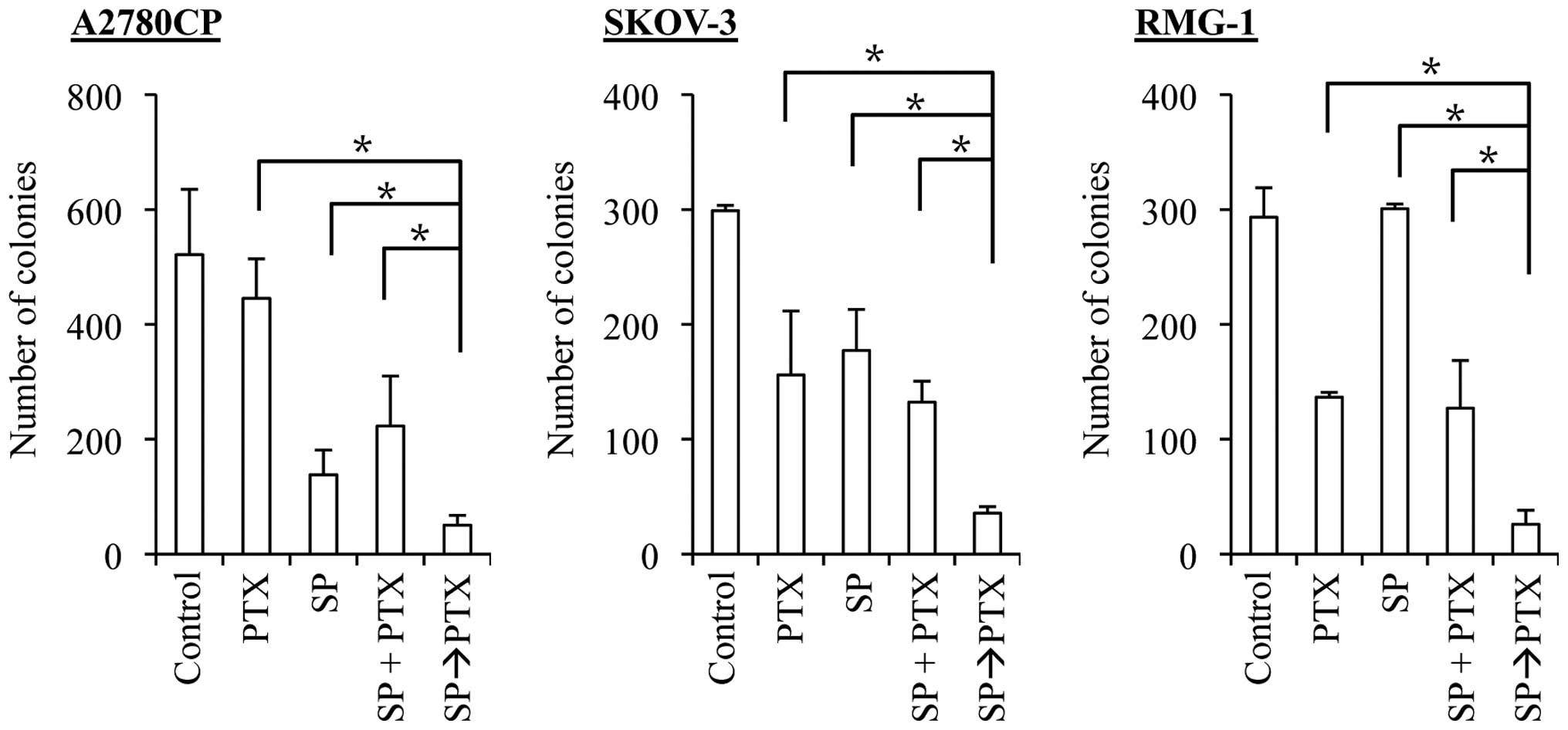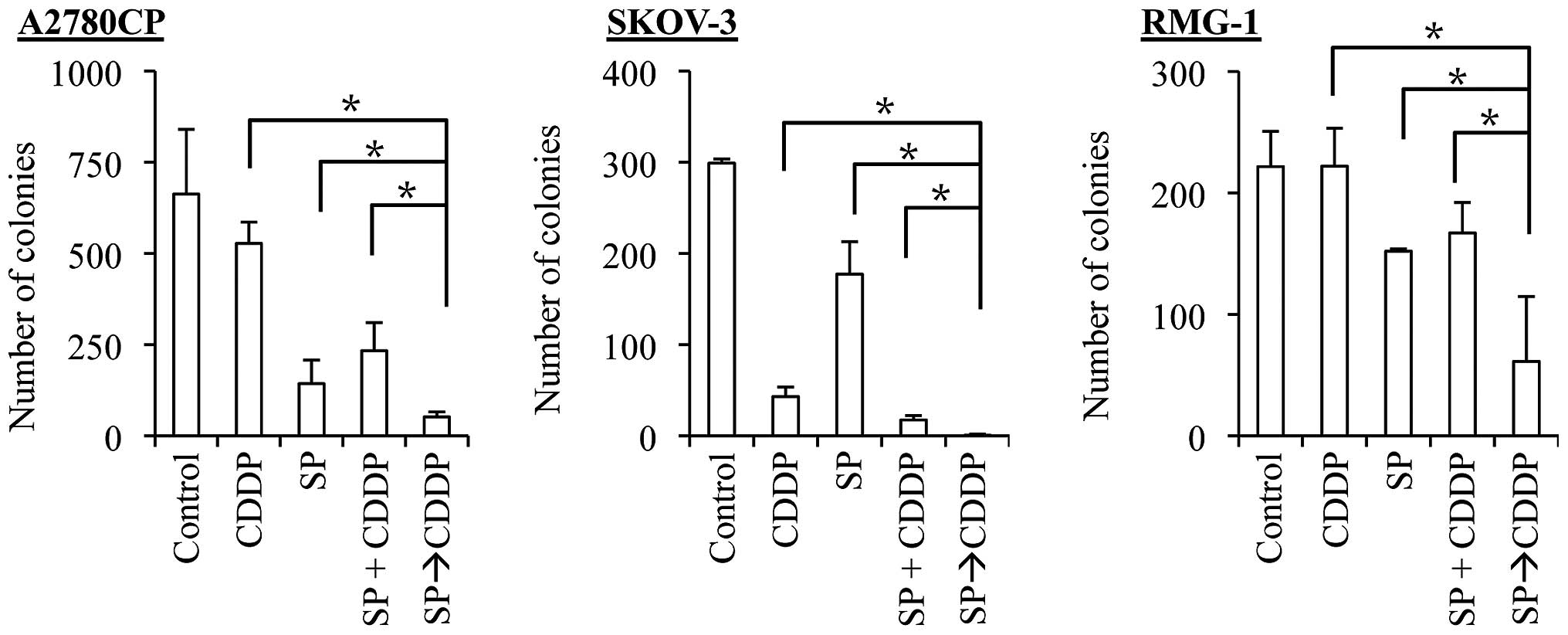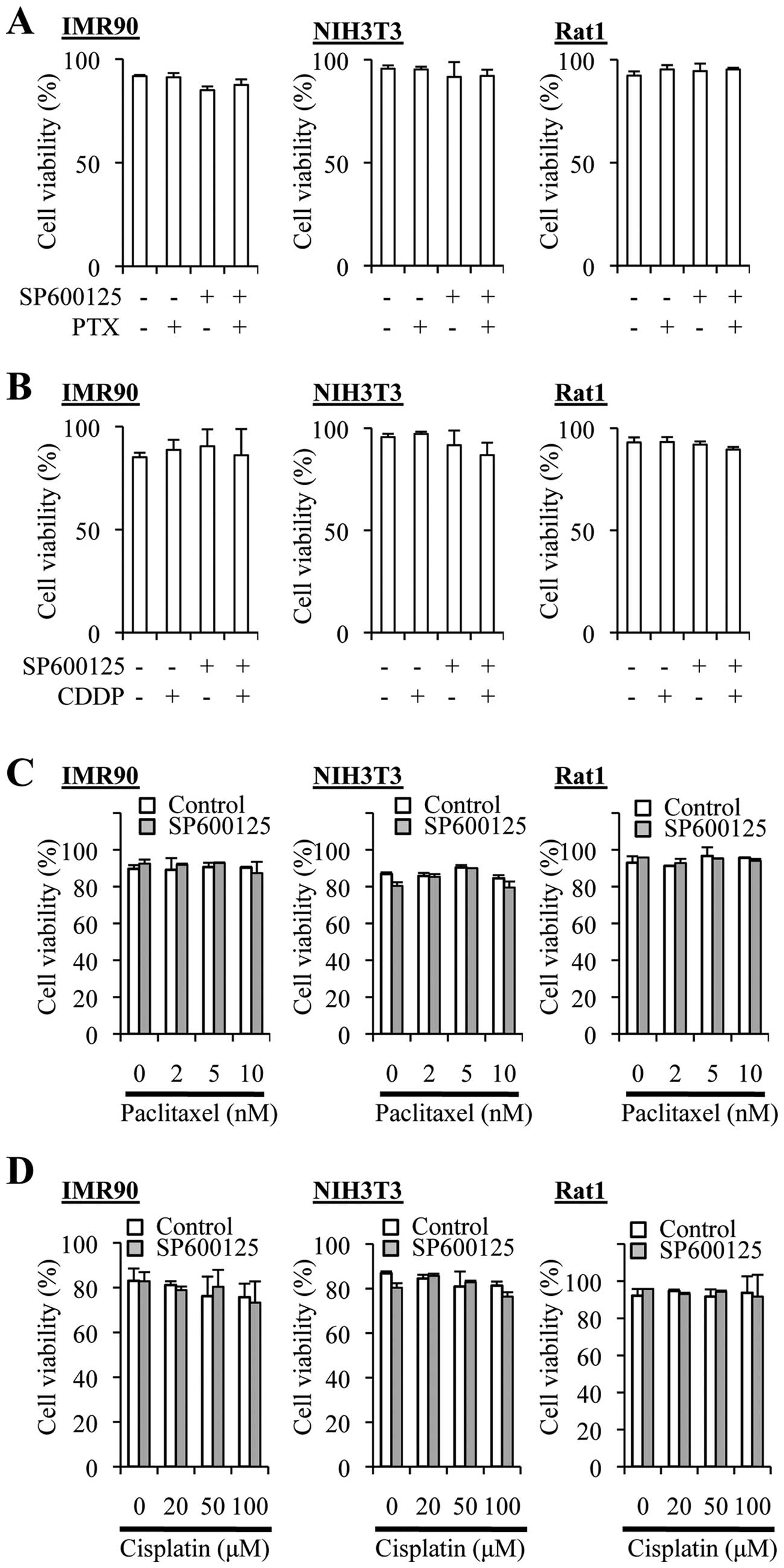|
1
|
Jayson GC, Kohn EC, Kitchener HC and
Ledermann JA: Ovarian cancer. Lancet. 384:1376–1388. 2014.
View Article : Google Scholar : PubMed/NCBI
|
|
2
|
Bookman MA: The addition of new drugs to
standard therapy in the first-line treatment of ovarian cancer. Ann
Oncol. 21(Suppl 7): vii211–vii217. 2010. View Article : Google Scholar : PubMed/NCBI
|
|
3
|
Liu X, Gao Y, Lu Y, Zhang J, Li L and Yin
F: Oncogenes associated with drug resistance in ovarian cancer. J
Cancer Res Clin Oncol. 141:381–395. 2015. View Article : Google Scholar
|
|
4
|
Yin F, Liu X, Li D, Wang Q, Zhang W and Li
L: Tumor suppressor genes associated with drug resistance in
ovarian cancer (Review). Oncol Rep. 30:3–10. 2013.PubMed/NCBI
|
|
5
|
Hamilton TC, Winker MA, Louie KG, Batist
G, Behrens BC, Tsuruo T, Grotzinger KR, McKoy WM, Young RC and
Ozols RF: Augmentation of adriamycin, melphalan, and cisplatin
cytotoxicity in drug-resistant and -sensitive human ovarian
carcinoma cell lines by buthionine sulfoximine mediated glutathione
depletion. Biochem Pharmacol. 34:2583–2586. 1985. View Article : Google Scholar : PubMed/NCBI
|
|
6
|
Yu D, Wolf JK, Scanlon M, Price JE and
Hung MC: Enhanced c-erbB-2/neu expression in human ovarian cancer
cells correlates with more severe malignancy that can be suppressed
by E1A. Cancer Res. 53:891–898. 1993.PubMed/NCBI
|
|
7
|
Suzuki N, Aoki D, Tamada Y, Susumu N,
Orikawa K, Tsukazaki K, Sakayori M, Suzuki A, Fukuchi T, Mukai M,
et al: HMOCC-1, a human monoclonal antibody that inhibits adhesion
of ovarian cancer cells to human mesothelial cells. Gynecol Oncol.
95:290–298. 2004. View Article : Google Scholar : PubMed/NCBI
|
|
8
|
Liu Z, Yamanouchi K, Ohtao T, Matsumura S,
Seino M, Shridhar V, Takahashi T, Takahashi K and Kurachi H: High
levels of Wilms' tumor 1 (WT1) expression were associated with
aggressive clinical features in ovarian cancer. Anticancer Res.
34:2331–2340. 2014.PubMed/NCBI
|
|
9
|
Yamanouchi K, Ohta T, Liu Z, Oji Y,
Sugiyama H, Shridhar V, Matsumura S, Takahashi T, Takahashi K and
Kurachi H: The Wilms' tumor gene WT1 - 17AA/- KTS splice variant
increases tumorigenic activity through up-regulation of vascular
endo-thelial growth factor in an in vivo ovarian cancer model.
Transl Oncol. 7:580–589. 2014. View Article : Google Scholar : PubMed/NCBI
|
|
10
|
Ohta T, Ohmichi M, Shibuya T, Takahashi T,
Tsutsumi S, Takahashi K and Kurachi H: Gefitinib (ZD1839) increases
the efficacy of cisplatin in ovarian cancer cells. Cancer Biol
Ther. 13:408–416. 2012. View Article : Google Scholar : PubMed/NCBI
|
|
11
|
Seino M, Okada M, Shibuya K, Seino S,
Suzuki S, Ohta T, Kurachi H and Kitanaka C: Requirement of JNK
signaling for self-renewal and tumor-initiating capacity of ovarian
cancer stem cells. Anticancer Res. 34:4723–4731. 2014.PubMed/NCBI
|
|
12
|
Suzuki S, Okada M, Shibuya K, Seino M,
Sato A, Takeda H, Seino S, Yoshioka T and Kitanaka C: JNK
suppression of chemotherapeutic agents-induced ROS confers
chemoresistance on pancreatic cancer stem cells. Oncotarget.
6:458–470. 2015. View Article : Google Scholar :
|
|
13
|
Kiguchi K, Kubota T, Aoki D, Udagawa Y,
Yamanouchi S, Saga M, Amemiya A, Sun FX, Nozawa S, Moossa AR, et
al: A patient-like orthotopic implantation nude mouse model of
highly metastatic human ovarian cancer. Clin Exp Metastasis.
16:751–756. 1998. View Article : Google Scholar
|
|
14
|
Okada M, Shibuya K, Sato A, Seino S,
Suzuki S, Seino M and Kitanaka C: Targeting the K-Ras-JNK axis
eliminates cancer stem-like cells and prevents pancreatic tumor
formation. Oncotarget. 5:5100–5112. 2014. View Article : Google Scholar : PubMed/NCBI
|
|
15
|
Okada M, Sato A, Shibuya K, Watanabe E,
Seino S, Suzuki S, Seino M, Narita Y, Shibui S, Kayama T, et al:
JNK contributes to temozolomide resistance of stem-like
glioblastoma cells via regulation of MGMT expression. Int J Oncol.
44:591–599. 2014.
|
|
16
|
Wang X, Song H, Yu Q, Liu Q, Wang L, Liu Z
and Yu Z: Ad-p53 enhances the sensitivity of triple-negative breast
cancer MDA-MB-468 cells to the EGFR inhibitor gefitinib. Oncol Rep.
33:526–532. 2015.
|
|
17
|
Hayakawa J, Ohmichi M, Kurachi H, Ikegami
H, Kimura A, Matsuoka T, Jikihara H, Mercola D and Murata Y:
Inhibition of extracellular signal-regulated protein kinase or
c-Jun N-terminal protein kinase cascade, differentially activated
by cisplatin, sensitizes human ovarian cancer cell line. J Biol
Chem. 274:31648–31654. 1999. View Article : Google Scholar : PubMed/NCBI
|
|
18
|
Bogoyevitch MA and Arthur PG: Inhibitors
of c-Jun N-terminal kinases: JuNK no more? Biochim Biophys Acta.
1784:76–93. 2008. View Article : Google Scholar
|
|
19
|
Kolomeichuk SN, Terrano DT, Lyle CS,
Sabapathy K and Chambers TC: Distinct signaling pathways of
microtubule inhibitors - vinblastine and Taxol induce JNK-dependent
cell death but through AP-1-dependent and AP-1-independent
mechanisms, respectively. FEBS J. 275:1889–1899. 2008. View Article : Google Scholar : PubMed/NCBI
|
|
20
|
Lee LF, Li G, Templeton DJ and Ting JP:
Paclitaxel (Taxol)- induced gene expression and cell death are both
mediated by the activation of c-Jun NH2-terminal kinase (JNK/SAPK).
J Biol Chem. 273:28253–28260. 1998. View Article : Google Scholar : PubMed/NCBI
|
|
21
|
Selimovic D, Hassan M, Haikel Y and Hengge
UR: Taxol-induced mitochondrial stress in melanoma cells is
mediated by activation of c-Jun N-terminal kinase (JNK) and p38
pathways via uncoupling protein 2. Cell Signal. 20:311–322. 2008.
View Article : Google Scholar
|
|
22
|
Sunters A, Madureira PA, Pomeranz KM,
Aubert M, Brosens JJ, Cook SJ, Burgering BM, Coombes RC and Lam EW:
Paclitaxel-induced nuclear translocation of FOXO3a in breast cancer
cells is mediated by c-Jun NH2-terminal kinase and Akt. Cancer Res.
66:212–220. 2006. View Article : Google Scholar : PubMed/NCBI
|
|
23
|
Wang TH, Popp DM, Wang HS, Saitoh M, Mural
JG, Henley DC, Ichijo H and Wimalasena J: Microtubule dysfunction
induced by paclitaxel initiates apoptosis through both c-Jun
N-terminal kinase (JNK)-dependent and -independent pathways in
ovarian cancer cells. J Biol Chem. 274:8208–8216. 1999. View Article : Google Scholar : PubMed/NCBI
|
|
24
|
Abend M: Reasons to reconsider the
significance of apoptosis for cancer therapy. Int J Radiat Biol.
79:927–941. 2003. View Article : Google Scholar
|
|
25
|
Stordal B and Davey R: A systematic review
of genes involved in the inverse resistance relationship between
cisplatin and paclitaxel chemotherapy: Role of BRCA1. Curr Cancer
Drug Targets. 9:354–365. 2009. View Article : Google Scholar : PubMed/NCBI
|
|
26
|
Stordal B, Pavlakis N and Davey R: A
systematic review of platinum and taxane resistance from bench to
clinic: An inverse relationship. Cancer Treat Rev. 33:688–703.
2007. View Article : Google Scholar : PubMed/NCBI
|
|
27
|
Eckhoff K, Flurschütz R, Trillsch F,
Mahner S, Jänicke F and Milde-Langosch K: The prognostic
significance of Jun transcription factors in ovarian cancer. J
Cancer Res Clin Oncol. 139:1673–1680. 2013. View Article : Google Scholar : PubMed/NCBI
|
|
28
|
Vivas-Mejia P, Benito JM, Fernandez A, Han
HD, Mangala L, Rodriguez-Aguayo C, Chavez-Reyes A, Lin YG, Carey
MS, Nick AM, et al: c-Jun-NH2-kinase-1 inhibition leads to
antitumor activity in ovarian cancer. Clin Cancer Res. 16:184–194.
2010. View Article : Google Scholar
|
|
29
|
Hayakawa J, Depatie C, Ohmichi M and
Mercola D: The activation of c-Jun NH2-terminal kinase (JNK) by
DNA-damaging agents serves to promote drug resistance via
activating transcription factor 2 (ATF2)-dependent enhanced DNA
repair. J Biol Chem. 278:20582–20592. 2003. View Article : Google Scholar : PubMed/NCBI
|
|
30
|
Hayakawa J, Mittal S, Wang Y, Korkmaz KS,
Adamson E, English C, Ohmichi M, McClelland M and Mercola D:
Identification of promoters bound by c-Jun/ATF2 during rapid
large-scale gene activation following genotoxic stress. Mol Cell.
16:521–535. 2004. View Article : Google Scholar : PubMed/NCBI
|
|
31
|
Li QQ, Lee RX, Liang H, Wang G, Li JM,
Zhong Y and Reed E: β-Elemene enhances susceptibility to cisplatin
in resistant ovarian carcinoma cells via downregulation of ERCC-1
and XIAP and inactivation of JNK. Int J Oncol. 43:721–728.
2013.PubMed/NCBI
|
|
32
|
Ohmichi M, Hayakawa J, Tasaka K, Kurachi H
and Murata Y: Mechanisms of platinum drug resistance. Trends
Pharmacol Sci. 26:113–116. 2005. View Article : Google Scholar : PubMed/NCBI
|
|
33
|
Potapova O, Haghighi A, Bost F, Liu C,
Birrer MJ, Gjerset R and Mercola D: The Jun kinase/stress-activated
protein kinase pathway functions to regulate DNA repair and
inhibition of the pathway sensitizes tumor cells to cisplatin. J
Biol Chem. 272:14041–14044. 1997. View Article : Google Scholar : PubMed/NCBI
|
|
34
|
Parekh H and Simpkins H: Cross-resistance
and collateral sensitivity to natural product drugs in
cisplatin-sensitive and -resistant rat lymphoma and human ovarian
carcinoma cells. Cancer Chemother Pharmacol. 37:457–462. 1996.
View Article : Google Scholar : PubMed/NCBI
|
|
35
|
Stordal B, Hamon M, McEneaney V, Roche S,
Gillet JP, O'Leary JJ, Gottesman M and Clynes M: Resistance to
paclitaxel in a cisplatin-resistant ovarian cancer cell line is
mediated by P-glycoprotein. PLoS One. 7:e407172012. View Article : Google Scholar : PubMed/NCBI
|
|
36
|
Xu H, Choi SM, An CS, Min YD, Kim KC, Kim
KJ and Choi CH: Concentration-dependent collateral sensitivity of
cisplatin-resistant gastric cancer cell sublines. Biochem Biophys
Res Commun. 328:618–622. 2005. View Article : Google Scholar : PubMed/NCBI
|
|
37
|
Yang H, Zou W, Li Y, Chen B and Xin X:
Bridge linkage role played by CD98hc of anti-tumor drug resistance
and cancer metastasis on cisplatin-resistant ovarian cancer cells.
Cancer Biol Ther. 6:942–947. 2007. View Article : Google Scholar : PubMed/NCBI
|
|
38
|
Yang LY, Trujillo JM, Siciliano MJ, Kido
Y, Siddik ZH and Su YZ: Distinct P-glycoprotein expression in two
subclones simultaneously selected from a human colon carcinoma cell
line by cis-diamminedichloroplatinum (II). Int J Cancer.
53:478–485. 1993. View Article : Google Scholar : PubMed/NCBI
|
|
39
|
Yang X and Pagé M: P-glycoprotein
expression in ovarian cancer cell line following treatment with
cisplatin. Oncol Res. 7:619–624. 1995.PubMed/NCBI
|
|
40
|
Comerford KM, Cummins EP and Taylor CT:
c-Jun NH2-terminal kinase activation contributes to
hypoxia-inducible factor 1alpha-dependent P-glycoprotein expression
in hypoxia. Cancer Res. 64:9057–9061. 2004. View Article : Google Scholar : PubMed/NCBI
|
|
41
|
Liu M, Li D, Aneja R, Joshi HC, Xie S,
Zhang C and Zhou J: PO(2)-dependent differential regulation of
multidrug resistance 1 gene expression by the c-Jun NH2-terminal
kinase pathway. J Biol Chem. 282:17581–17586. 2007. View Article : Google Scholar : PubMed/NCBI
|
|
42
|
Fitzgerald JB, Schoeberl B, Nielsen UB and
Sorger PK: Systems biology and combination therapy in the quest for
clinical efficacy. Nat Chem Biol. 2:458–466. 2006. View Article : Google Scholar : PubMed/NCBI
|
|
43
|
Lee MJ, Ye AS, Gardino AK, Heijink AM,
Sorger PK, MacBeath G and Yaffe MB: Sequential application of
anticancer drugs enhances cell death by rewiring apoptotic
signaling networks. Cell. 149:780–794. 2012. View Article : Google Scholar : PubMed/NCBI
|
|
44
|
Morton SW, Lee MJ, Deng ZJ, Dreaden EC,
Siouve E, Shopsowitz KE, Shah NJ, Yaffe MB and Hammond PT: A
nanoparticle-based combination chemotherapy delivery system for
enhanced tumor killing by dynamic rewiring of signaling pathways.
Sci Signal. 7:ra442014. View Article : Google Scholar : PubMed/NCBI
|















